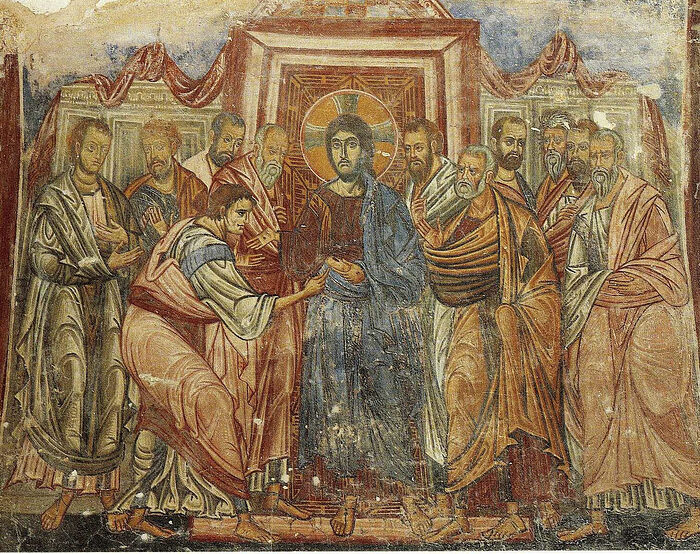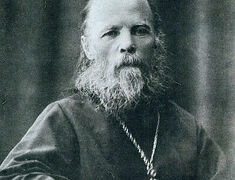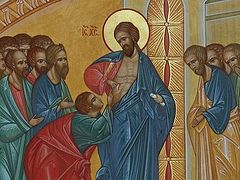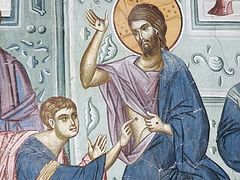Thomas Sunday isn’t just about Thomas alone, but about Christ as well. It treats the issue of Thomas’ belief, but it also testifies to the truth of Christ’s Resurrection. For before his existential confession in the Resurrection, Thomas also faced the truth of Christ’s Resurrection as a question that’s impossible to address with intellectual logic. Therefore, this truth, when he saw the resurrected Lord, shocked all his reasoning ability (Jn. 20:28).
This shock is similar to that of the Prophet Isaiah when he saw the King, the LORD of hosts (Is. 6:5). With this vision, Thomas knew the sin of his unbelief, that if he “had not seen and yet believed,” (cf. Jn. 20:29), he would have known the Resurrected Lord with his whole being, and not only with that part that is dictated simply by logic.
Man was created from the beginning to know God. This knowledge isn’t intellectual and theoretical but existential, and the path to this knowledge is faith. True faith in God leads to the living knowledge of God. Even faith itself transforms into knowledge, and knowledge into the communion of eternal life. This is the meaning of what Christ said: And this is life eternal, that they might know Thee the only true God, and Jesus Christ, Whom Thou hast sent (Jn. 17:3). The knowledge of God that is born of faith wholly transcends the knowledge born of intellectual conviction. The latter reveals to us matters about God, because it relies on human wisdom, but the former reveals to us God Himself, because it comes from Divine illumination.
The overwhelming majority of Christians are content with this theoretical intellectual belief. Such Christians have an external relationship with God, which doesn’t touch their inner heart and being. It’s a sort of social connection with God based on moral principles. The intellect isn’t rejected in Orthodoxy, but the reliance on it alone has always constituted a real danger on a Christian’s journey of faith in God.
The salvation of man isn’t an intellectual affair or an intellectual belief in all that God has done in the dispensation of the Cross for our salvation. Rather, it’s an absolute faith that contains an existential experience of Christ’s presence.
Man’s true being is the spirit, not the intellect. Therefore, Christ’s response to Thomas that blessed are they that have not seen, and yet have believed showed that God condescends and reveals His mysteries to the man who submits himself to Him by faith, in a Sacramental, mystical manner, which transcends the limitations of the intellect, such that man has the opportunity to know God with all his being and spirit.
Thus, the Apostle says: Without faith it is impossible to please Him (Heb. 11:6). St. Makarios the Great says that knowledge that works by faith, of itself makes the soul worthy to receive “the knowledge of Divine mysteries” and to enter, by faith, into the communion of eternal life.
Verily, God’s majesty and the loftiness of His glory are beyond man’s intellectual capability. Hence, the faith that the Holy Fathers talked about is the soul’s ability to transcend the power of human comprehension and accept the experience of the Divine presence within it.
St. Symeon the New Theologian says: “Divinity, that is the grace of the All-Holy Spirit, never reveals itself to a man who is outside the faith.”
This living faith isn’t something established once and for all, as is the case in Protestant Evangelical and Baptist innovations, because this makes God an idol, not a living God. Faith is a journey of growth in man’s submission to God’s will, with a trust transcending every doubt in His presence, providence, and righteousness.
This is why the end of faith is Christ Himself—the true faith, according to our Holy Fathers: nothing else than Jesus Christ.
St. Ignatius of Antioch says: “Perfect faith is Jesus Christ.” That’s why man is conscious that perfect faith has no limit and is beyond all the power of his intellectual comprehension.
The Psalmist says: The knowledge of Thee is too wonderful for me; it is high, I cannot attain to it (Ps. 138:6).
For the knowledge of God that proceeds from faith is the direct communion of man with God; it’s the attainment of the perfection to which he is called. This dogma constitutes the foundation of man’s salvation in the journey of the Orthodox faith.
A living faith speaks in the heart that has been purified of all passions and sin and has fulfilled all virtue. The man who possesses such a heart can meet his Creator and know Him with personal knowledge. St. Gregory Palamas says: “For if you study all natural philosophy from Adam until the end, you will remain without purity, foolish, not a wise person.”
For the superior level of clarity in the eye is not concealed in the clarity of the external objects that it observes, but in the absence of any internal blur or darkness within it.
The removal of the internal veil and darkness in the eye of the mind requires continuous spiritual struggle and growth in the life of asceticism, piety, and self-denial. It is faith that leads to the knowledge of the truth, and it can find its solid foundation nowhere but in piety and humility. Thus, in order for knowledge to transcend all human wisdom and become a path to truth and the tool of charity, according to St. Gregory Palamas, it must be preceded by killing the serpent first, that is “after overcoming the pride that proceeds from this wisdom.” Pride makes knowledge susceptible to satanic fantasies, so that it will later become prone to every dogmatic perversion.
For this reason specifically, the Orthodox Faith is connected with the Patristic theology that is taught by the Church—the theology of the humble saints and seers of God’s mysteries. Intellectual and scholastic theology beget rigid theoretical concepts of the faith that transform this faith into a moral lifestyle and legal definitions. Whereas a living faith that is based on ascetical theology purifying the passions leads to the vision of God’s mysteries. When the Apostle said: Great is the mystery of godliness: God was manifest in the flesh (1 Tim. 3:16), he proved that godliness and piety are the doorway to the mysteries of faith and to the truths related to God’s revelations of Himself.
Thomas’s absence among the Apostles was a work of providence; it served for an essential goal: It is Christ’s will to heal the doubt and lack in our faith. It’s strange that the Lord asks that man believe in Him without seeing, and that He insists on this request, because faith is a gift and a revelation of God Himself, when man opens his heart, not his intellect alone, to this Divine gift. That’s why man will be asked about his faith on Judgment Day, and that’s why God is patient with our lack of faith, in order to heal us and save us, not to submit to our weaknesses.
By saying: Reach hither thy finger, and behold my hands (Jn. 20:27), Christ showed unlimited love and unbounded patience for our salvation. And He took the initiative before Thomas asked Him, offering forth His body and His wounds. Christ condescended to the weakness of His disciple’s weakness, just as He continuously condescends to men’s weaknesses and accepts to have His salvific work doubted.
With much humility, He accepted the doubt of His disciple who had accompanied Him for three years, day and night. He gently reproached him and didn’t condemn him, because he confessed and repented. And to this day, if Christians don’t live the resurrection of their Christ with a living spirit, with prayer, fasting, and ascetic labor, not with the limited intellect, then they live without Christ.
Until the time comes when we cry out from the bottom of our hearts: My LORD and My God (Jn. 20:28), our faith will remain theoretical, lacking the real presence of the triumphant Lord—a faith with neither life nor spiritual talents, neither grace nor salvation.





